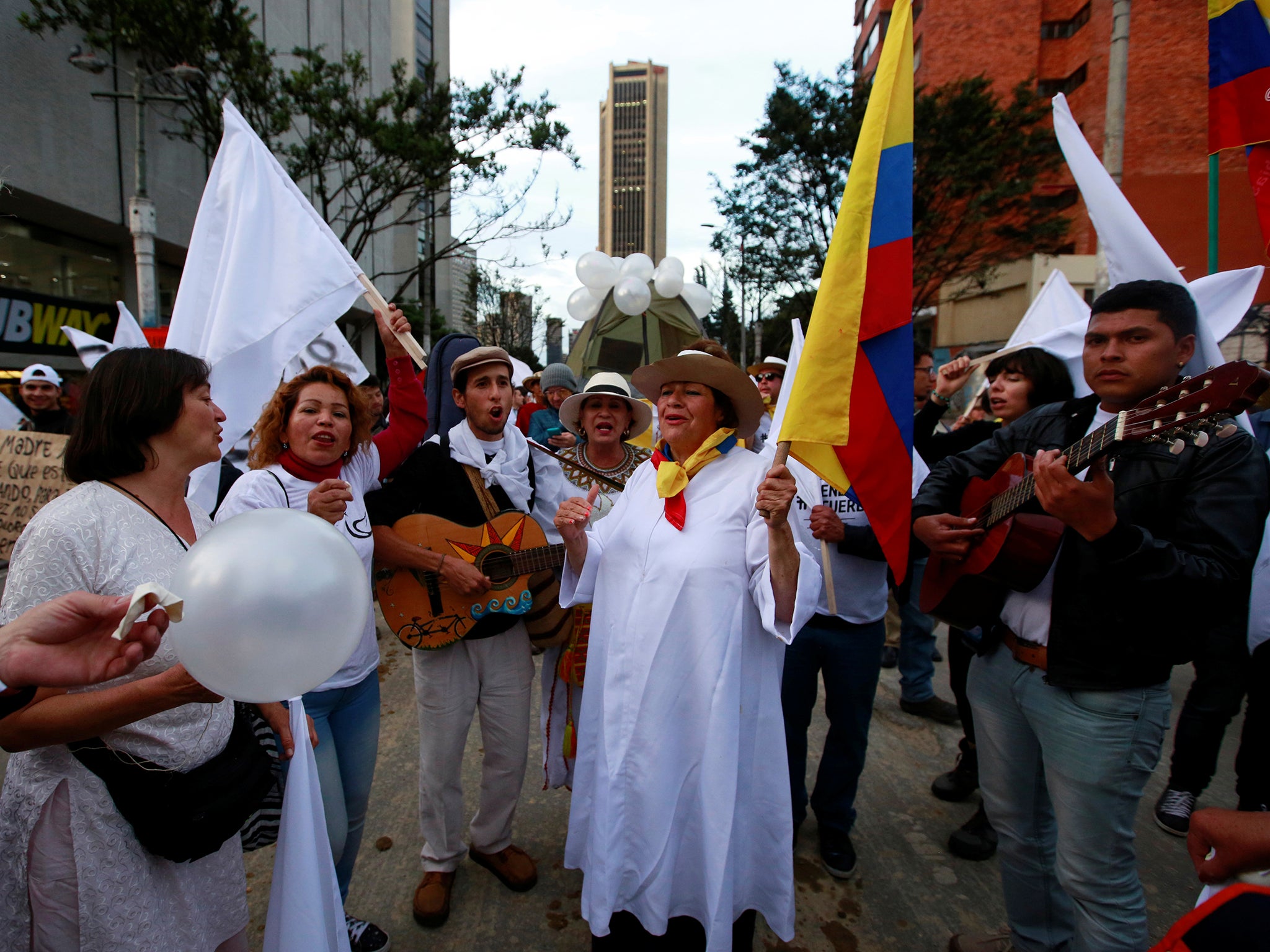Colombian government and Farc to sign new peace deal, defying referendum result to end 50-year conflict
New accord will be presented to Congress for ratification, rather than put to second public vote

Your support helps us to tell the story
From reproductive rights to climate change to Big Tech, The Independent is on the ground when the story is developing. Whether it's investigating the financials of Elon Musk's pro-Trump PAC or producing our latest documentary, 'The A Word', which shines a light on the American women fighting for reproductive rights, we know how important it is to parse out the facts from the messaging.
At such a critical moment in US history, we need reporters on the ground. Your donation allows us to keep sending journalists to speak to both sides of the story.
The Independent is trusted by Americans across the entire political spectrum. And unlike many other quality news outlets, we choose not to lock Americans out of our reporting and analysis with paywalls. We believe quality journalism should be available to everyone, paid for by those who can afford it.
Your support makes all the difference.Colombia's government and Farc guerrillas will sign a new peace accord on Thursday, after a previous agreement to end their half-century-old war was defeated in a referendum, both parties said.
The new, revised accord will be submitted to Congress for approval, rather than put to another referendum, they added.
Last month voters taking part in that referendum surprisingly snubbed the first accord. Critics said it went too easy on the rebels, who have been waging what is now Latin America's last major insurgency.
“The government and Farc delegations have agreed to sign the final agreement to end the conflict and build a stable and lasting peace,” negotiators from both sides said in a statement Tuesday.
The new accord was first announced on November 12. The signing will take place at 11.00am (4.00pm GMT) at the Colon Theater in Bogota.
The accord will later be submitted to Congress for its approval, the two sides said.
“We are working out the procedures necessary for this,” they said.
The government holds a majority in the legislature.
President Juan Manuel Santos insists the new proposal is stronger and takes into account changes demanded by his political opponents.
However his chief rival, ex-president Alvaro Uribe, has rejected even the revised deal.
Uribe has insisted, for instance, that Farc leaders should not be allowed to run for office while still serving sentences for atrocities.
“Whether the entire (current) text is voted on, or just the issues that have been sensitive and where there has been no agreement, we ought to do it by national referendum,” Uribe said.
Santos's government is scheduled to present its revised peace deal in Congress on Wednesday to discuss its details.
Santos called on Tuesday for it to be implemented quickly.
A two-way ceasefire between the government and the Farc has been in force since August. But the sides have warned it is fragile.
“This limbo is increasing the risks,” Santos told reporters.
“It is urgent that we move to the second phase of regrouping the Farc” for their demobilisation, he said.
He spoke after an urgent meeting with top officials to tackle a recent wave of alleged political killings in southern Colombia.
Fears for the ceasefire had already risen last week when two Farc guerrillas were killed in what authorities said was a clash with the army.
Uribe has offered to meet with the Farc. But the force rejected that proposal, branding Uribe an obstacle to peace.
“Uribe misgoverned, corrupted and caused bloodshed in Colombia for eight years” when he was in office to 2010, said one of the Farc's commanders, Pablo Catatumbo, on Twitter.
“He has never wanted peace, only the defeat of the Farc, which he couldn't achieve.”
Political analyst Jorge Restrepo said it would be better if there were a consensus on Colombia on the new accord.
“But that is almost impossible to achieve” given the demands of Uribe's party, Restrepo said.
What is more, if there is opposition to the accord the government and the Farc will be more compelled to show their commitment to complying with it, said Restrepo, head of a conflict analysis consultancy called Cerac.
“And Uribe has no veto or blocking power,” said Restrepo.
Commander Rodrigo “Timochenko” Londono and other Farc leaders arrived in Bogota on Monday to finalise the deal.
Ahead of the referendum, the Farc's 5,700 fighters gathered to wait in their jungle bases.
The full peace accord aims to see them demobilise and disarm over the coming months under UN supervision.
But officials warned that the longer the accord is delayed, the higher the risk of violence.
The Colombian conflict started in 1964 when the Farc formed to fight for land rights for rural communities.
It drew in various left and right-wing armed groups, state forces and gangs.
The conflict has killed at least 260,000 people and displaced seven million, according to authorities.
AFP
Join our commenting forum
Join thought-provoking conversations, follow other Independent readers and see their replies
Comments